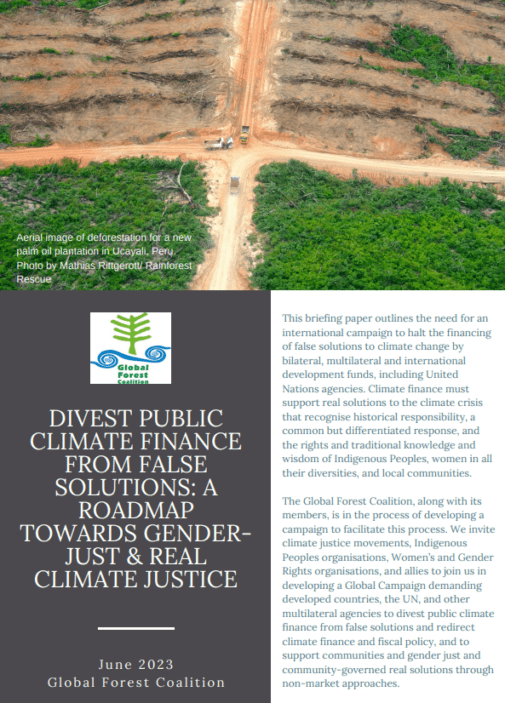Results for “geoengineering”
The Net Zero Files: How greenwash is being used to reduce climate ambition
CLARA LAUNCHES THE NET ZERO FILES Earth is finite, nature is finite, and the carbon-holding capacity of nature is finite. The Net Zero Files, 18 concise briefings which call out bad Net Zero commitments and put the focus back on deep decarbonization, were launched this week by the Climate, Land, Ambition, and Rights Alliance (CLARA) at https://www.clara.earth/netzero and on Twitter @NetZeroFiles. The remaining carbon budget to keep atmospheric concentrations of greenhouse gases below critical temperature thresholds is very limited. Yet these limitations are …
Corporate contagion: How the private sector is capturing the UN Food, Biodiversity and Climate Summits
Three big United Nations summits are coming up on food, biodiversity and the climate, and the private sector is poised to have a major influence at all of them, making 2021 a key year for the corporate takeover of multilateral processes. With civil society participation in these summits limited by the COVID-19 pandemic, several extremely harmful policy outcomes are being cooked up. If corporations have their way, these summits will protect business interests over urgent and effective action on food …
Economia circular ou círculo vicioso? Como a captura corporativa na elaboração de políticas e de incentivos perversos leva ao desmatamento
O novo relatório em nossa série Forest Cover analisa o ciclo de auto-reforço da captura corporativa de políticas e os incentivos perversos que prejudicam a biodiversidade. Inclui análises por grupos membros e aliados em nove países diferentes sobre incentivos para a expansão da pecuária insustentável, as plantações comerciais de árvores, a geração de bioenergia e outras indústrias que levam à perda de florestas. Exemplos da América Latina, Europa, Ásia e África mostram como esses incentivos estão enraizados devido à captura …
Circular economy or vicious cycle? How corporate capture of policy-making and perverse incentives are driving deforestation
Our new report in our Forest Cover series analyzes the self-reinforcing cycle of the corporate capture of government policy-making and perverse incentives that harm biodiversity. It includes analysis by member groups and close allies in nine different countries on incentives for the expansion of unsustainable livestock farming, commercial tree plantations, bioenergy generation and other industries driving forest loss. Examples from Latin America, Europe, Asia and Africa show how entrenched these incentives are due to the corporate capture of decision-making both …
Forest Cover 61: #OurNatureIsNotYourSolution, International Day for Biological Diversity
As part of the #OurNatureIsNotYourSolution campaign we’re launching this special edition of our magazine Forest Cover, written in collaboration with our member groups. Forest Cover highlights how hype around NBS is being used as cover for pushing forest offsets, monoculture tree plantations and other false solutions, and also provides examples of the real solutions that our members in Colombia, Ghana, Nepal, Panama, Paraguay and Sri Lanka are engaged in.
Derail negotiations on market mechanisms: false solutions will not bring equity and climate justice
by Souparna Lahiri, Global Forest Coalition, India The outcome of COP24 in Katowice last December failed on many counts, despite the “victory leap“ of the Polish Secretary of State for Energy (COP24’s president-designate). But what made front page news was the failure of governments to agree to a text on Article 6, which deals with market-based mechanisms in the Paris Agreement. We know why it failed, and what the primary barriers to achieving consensus were: Double counting: Basically cheating by …
Feminists at UNEA4 Continue the Call for the Right to a Healthy and Sustainable Environment
Reflecting on the outcomes of the 4th Meeting of the United Nations Environment Assembly in Nairobi, Kenya (UNEA-4), the Women’s Major Group offered the following statement: Nairobi, Kenya. The conclusion of UNEA-4 saw a landmark resolution to promote gender equality and the human rights and empowerment of women and girls in environmental governance. The Women’s Major Group welcomes the commitment to strengthen the gender dimension of environmental policy and the resolution’s recognition of the importance of protecting human rights. We …
Forest Cover 57 – 1.5°C from a community perspective
As governments congregate once more for a climate COP, this time in Katowice, Poland, Forest Cover 57 looks critically at the Intergovernmental Panel on Climate Change (IPCC)’s latest assessment report on 1.5°C of global warming. It analyses what such a target means from a community perspective and makes the case for community conservation as an effective, safe and equitable way of removing carbon from the atmosphere. Through participatory community assessments, the Community Conservation Resilience Initiative (CCRI) has shown how rights-based approaches to conservation and forest restoration work in practice, and can be used as a model for global efforts to fight climate change. This issue makes the case that there are community-based, gender responsive alternatives to the technological, corporate-controlled pathways that the IPCC and UNFCCC are leading the world towards.
Fire and Plantations in Portugal: A case study on the risks of using tree plantations to remove carbon from the atmosphere
We are pleased to share the following piece originally published in Science for the People, a recently revitalized organization of activists and scientists that published a bimonthly magazine from 1969 to 1989. This essay is part of a special issue on geoengineering in the lead up to the official relaunch of the publication, slated for early 2019. You can read the rest of the collection at Science for the People’s website or become a Patreon donor to receive a printable …
From Bangkok to Katowice: In whose interests are the climate negotiations?
by Souparna Lahiri, 2nd September, 2018 This week the negotiations over the Paris Rulebook and Paris Agreement Work Programme (PAWP) recommence in Bangkok. It reminds me of the 2009 Bangkok intersessional, in the run up to the Copenhagen Conference of the Parties (COP), where there was much expectation in the air and great mobilisations on the streets. Back then, the US and big developing countries including China and India crafted the Copenhagen Declaration, which demolished the Kyoto architecture of binding …
Roots Newsletter January 2018
Looking to the year ahead with solidarity, strength and determination By Mary Louise Malig Best wishes for the New Year! As we forge ahead into 2018 we are looking forward to facing the new opportunities and challenges that lay ahead, together. This Roots issue looks back at the last quarter of 2017. GFC participated in and mobilised around numerous international fora in our efforts to defend the rights of forests peoples, Indigenous Peoples and communities. We targeted policy and funding …
The bittersweet results of the climate talks in Bonn
By Coraina de la Plaza* Another climate COP ended in the backdrop of extreme weather events worldwide – ravaging wildfires in Europe, massive hurricanes that devastated the Caribbean islands, record breaking floods in Asia, major droughts in Africa, just to name a few, causing the deaths and displacement of thousands. Many defined COP 23 as mainly technical or a “process COP”, but it was during this COP that many of the details had to be hammered out for the development …
UN institutions must comply with target to halt deforestation by 2020, say forest groups on International Day for Biological Diversity
May 22, 2016. On the International Day for Biological Diversity, and a day ahead of the United Nations Environment Assembly meeting in Nairobi, the Global Forest Coalition (GFC) [2] reminded [3] policy makers that halting deforestation by 2020, in line with target 15.2 of the Sustainable Development Goals (SDGs) [4], and community-driven forest restoration, must become key priorities in dealing with climate change and biodiversity loss. Despite the UN’s historic pledge to halt deforestation by 2020 most countries and UN …
In the aftermath of the Paris Agreement, nature and humanity lose
Mary Louise Malig* The Paris Agreement has been signed in New York with much fanfare, a lot of shaking hands and patting each other on the back, and claims that “we did it” – that is, agreed a historic climate agreement that would save the planet from climate chaos. This week, government delegates and civil society are getting back to work in Bonn, in meetings of the Subsidiary Body for Implementation (SBI 44), the Subsidiary Body for Scientific and Technological …
COP 21: Victorious Corporations
By Miguel Lovera* Negotiations to solve climate change started 23 years ago. Ever since then, a trend towards commercializing the problems and the solutions started to be identifiable. More and more neoliberal tendencies that dominated developed country governments -and important developing ones too- took over all aspects and approaches to the problem. Suddenly, civil society also became swamped in the same bog, logged with noncommittal and denying language and flooded with false solutions. Paris FCCC/COP XXI was not an exception …
Biomyths: Bioenergy carbon neutrality myth is a time bomb under climate deal
7th December: The Global Forest Coalition [1] has launched a new report at the Paris climate talks today titled “Biomyths, the Costly Carbon Scam of Bioenergy”. [2] The report exposes how large-scale bioenergy is being promoted as a replacement to some fossil fuels, based on what it calls the myth of its “carbon neutrality”. Download the full report (English): Biomyths – the costly carbon scam of bioenergy Download the Executive Summary: English, French, Spanish “Accepting that large-scale bioenergy can be carbon neutral will …
The Smooth Operators of Biodiversity Conservation
By Simone Lovera* For those who are currently following the highly polarized and unproductive climate negotiations it might seem unbelievable, but there are still UN processes that succeed to agree on a reasonable amount of decisions during little more than 3 full negotiation days. The 19th meeting of the Subsidiary Body on Scientific, Technical and Technological Advice of the Convention on Biodiversity (CBD-SBSTTA), which took place from 4 to 7 November in Montreal, even ended a little early, having adopted …








